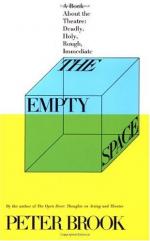
|
| Name: _________________________ | Period: ___________________ |
This test consists of 5 multiple choice questions, 5 short answer questions, and 10 short essay questions.
Multiple Choice Questions
1. Which production of Genet's did the author direct in Paris where it was necessary to mix actors of very different backgrounds?
(a) The Balcony.
(b) Ubu Roi.
(c) The Emperor's Theme.
(d) Waiting for Godot.
2. Who allegedly saw a play for the first time in their lives and were confronted with Waiting for Godot with no problem at all in following what, to regular theatre-goers, was incomprehensible?
(a) A circus troupe.
(b) The Chinese army.
(c) San Quentin prisoners.
(d) School children.
3. "Brecht recognized this and in his last years he surprised his associates by saying that the theatre must be ____."
(a) Bold.
(b) Naive.
(c) Dishonest.
(d) Brazen.
4. "Both [rough and holy] theatres feed on deep and true ______ in their audiences."
(a) Acceptance.
(b) Love.
(c) Attention.
(d) Aspirations.
5. Which playwright does the author hold in the greatest esteem as one who combines the Rough Theatre with the Holy Theatre?
(a) Beckett.
(b) Brecht.
(c) Shakespeare.
(d) Albee.
Short Answer Questions
1. In performance, what is the relationship the author establishes?
2. After a production of Love Labour's Lost, what did the author throw out and never work with again?
3. In Paris, Brook directed what show in which he did all in his power to inhibit applause, be cause appreciation of the actor's talents seemed irrelevant in a Concentration Camp document?
4. "In work with a designer, a sympathy of _____ is what matters most."
5. In what Shakespearean play is Gloucester blinded?
Short Essay Questions
1. How does the author describe the difference between "Rough Theatre" and "Holy Theatre"?
2. How does the author compare the cinema to the theatre?
3. What is the rough experience which comes from Marat/Sade?
4. How does the author view "the actor?" Which British actors does the author compare in "The Immediate Theatre"?
5. What is one example of Shakespeare's which the author uses as an example in "The Rough Theatre", and what is he saying with this example?
6. How does the author approach form and content between the actor and director?
7. How does the author feel that Brecht approaches the "Holy"?
8. What does the author describe happening when a Brechtian approach is applied to other works?
9. How does the author view "pre-planning" in approaching a rehearsal process?
10. How does the author view Method acting?
|
This section contains 863 words (approx. 3 pages at 300 words per page) |

|




